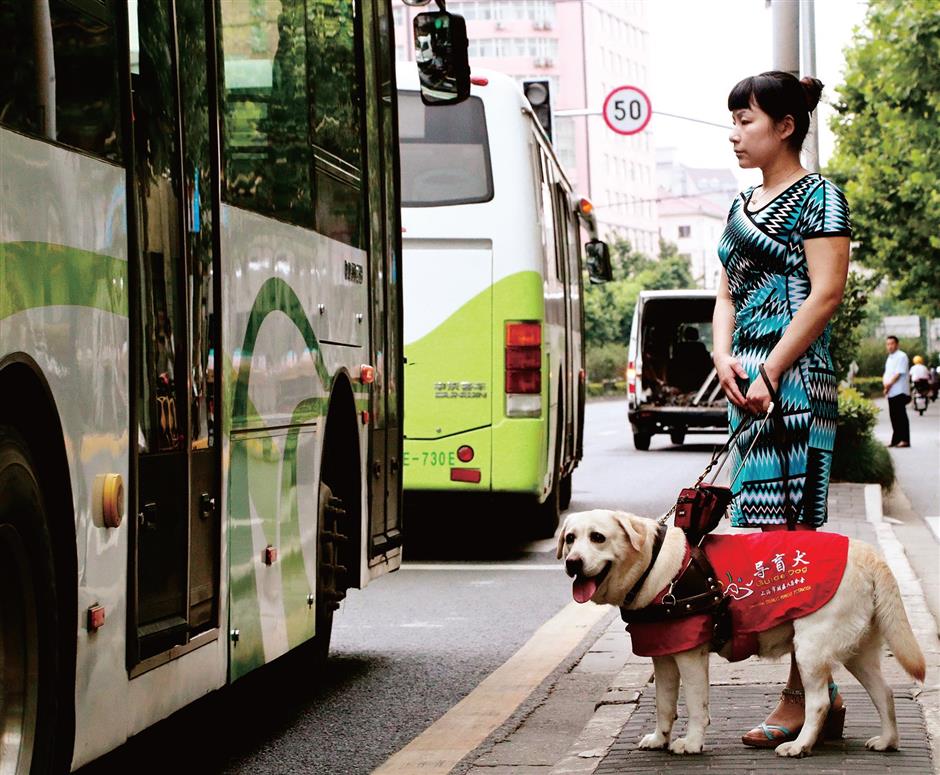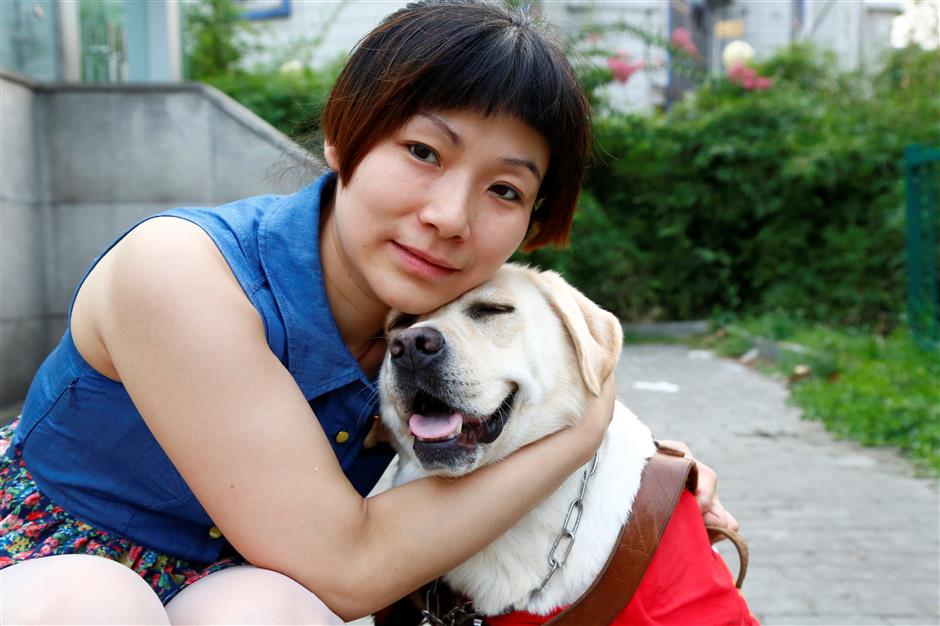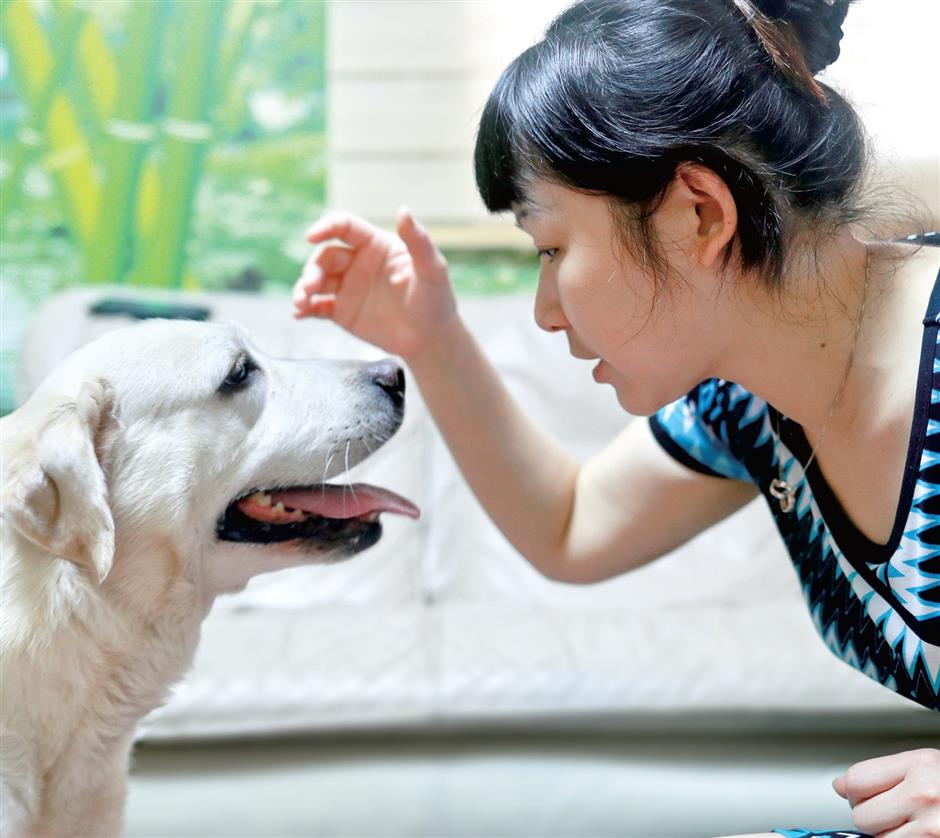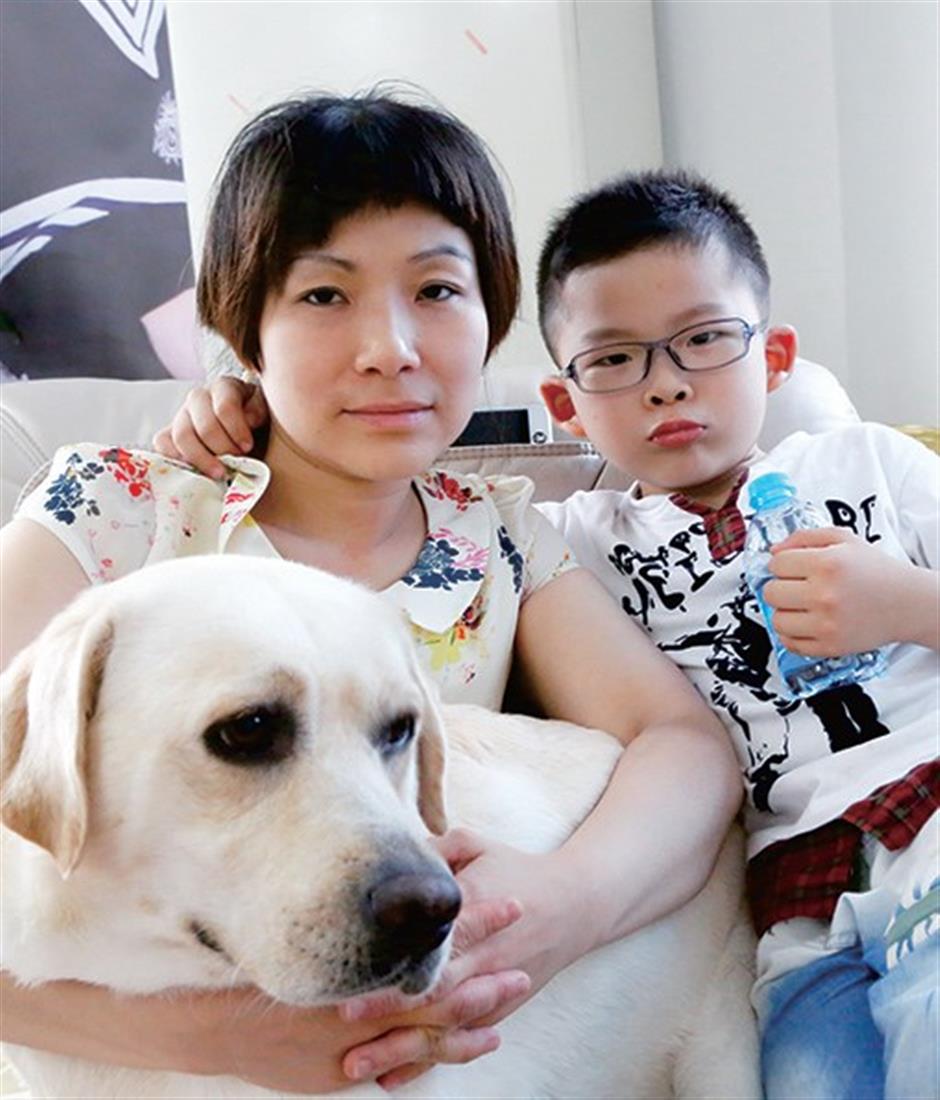Guiding eyes for visually impaired
When Chen Xin takes the subway or bus, her 8-year-old guide dog Ersibin is always by her side.
Ersibin came from the Nanjing guide dog training base. She has an amiable personality and is friendly with everyone and always performs well on duty.
Chen became visually impaired after giving birth to her son. She only has slight light perception and cannot travel on the streets on her own. Ersibin is a perfect companion.

Chen Xin and her 8-year-old guide dog Ersibin wait for bus on the sidewalk in Shanghai. Ersibin came from the Nanjing guide dog training base. She has an amiable personality and is friendly with everyone and always performs well on duty.
“I learned about having a guide dog from my insurance agent, who knew about my situation, as in, I didn’t have a family member to accompany me when I went outside. The agent saw a guide dog on the street and asked its owner for information,” she said.
When the guide dog program was first launched about a decade ago, potential users had to travel to Nanjing City and stay at the training base for three weeks. There they learned common English phrase commands and established a bond with their potential dog through day-to-day training. As the program developed, users outside Nanjing didn’t have to go there for the orientation training. Instead, the dogs were brought to Shanghai directly by the instructors.
The 40-year-old applied to the guide dog program in 2013 and a year later, Ersibin was brought to Chen’s home for three weeks training at the beginning of 2014.
Compared to most of the Labrador guide dogs, Ersibin is quite small in size. The program considers all aspects when matching a guide dog with a potential owner. And, given Chen is not tall, Ersibin is an ideal partner for her.
“The instructor from Nanjing stayed in Shanghai for more than two weeks to help train the dog,” Chen said. “Ersibin needed to learn the specific routes I traveled on daily basis, like to the subway or the Shanghai Disabled Persons’ Federation.”
The training was also a learning process for both dog and user. They had to adapt to each other’s habits. For example, Chen needed to learn how the dog reacted to an approaching staircase or slope.
After training, both the guide dog and user must pass a test, to evaluate the bond between dog and owner, such as owner commands, as well as the dog’s performance on the streets. You get three attempts to pass the test but Chen passed at her first shot.

Chen Xin and guide dog Ersibin.
Ersibin lives with Chen and her son, Chen Shouyan, who’s now in third grade.
“I like Ersibin a lot and I often play with her. She’s quite energetic but quiet at the same time. She only barks when there are people coming to our home,” said Chen Shouyan. “She also eats a lot. If you don’t take the kibble away, she’ll just keep eating and does not seem to know when she is full.”
Now Chen works mostly at home as a volunteer on a project of creating audio description films for the blind and visually impaired, which allows people to enjoy the cinema barrier-free.
This is Ersibin’s second job as a guide dog. Her first position was with another blind user, surnamed Gu, in Songjiang District, when she was a 1-year-old.
In 2012, she got lost from Gu’s workplace, a massage shop. Gu and her colleagues spent all day and night searching for Ersibin but had no luck. Her absence was widely reported by local news outlets and on Weibo.
After four days, a man, surnamed Liu, contacted the journalist, who posted the missing dog notice on Weibo, and said he found Ersibin walking on Xilin Road. She wasn’t hurt but was in shock.
The guide dog training base then took Ersibin back to Nanjing where she received an additional month of training before going to Chen’s home.
“The dogs are trained to forget the memories of their previous owners on duty, so they can follow commands at all times,” said Chen.
The guide dogs live a very disciplined life and make big sacrifices to help people who live without light and colors. They are always at attention and follow every command promptly.
“The training of a guide dog is very difficult and strict. They must maintain a stable state at all times. For example, normal dogs are scared of firecrackers set off in celebration of the Chinese New Year. The guide dogs are trained to conquer the fear of firecrackers,” explained Chen.
The Nanjing training base regularly checks in with all guide dog users to ensure everything is running smoothly. The dogs receive routine health exams and they also have insurance.

Chen Xin interacts with Ersibin at home.
Ersibin is constantly learning new things while living with Chen.
“I like to eat sweet treats like cakes, so if I say the names of the bakeries I visit frequently, Ersibin would take me directly there from home,” laughed Chen. “And she’s quite lazy, if there’s an elevator or escalator in the building. She’d never take the staircase.”
The guide dog not only knows how to take its owners onto buses and subways, they even know how to transfer from one metro line to another.
Traveling with guide dogs in Shanghai has become much easier and convenient in recent years. In the beginning, Chen encountered cases when she wasn’t allowed on the bus with Ersibin, now there’s no problem.
“It’s been much better, if someone argues about having a dog on public transportation, other passengers often help me out and say guide dogs are allowed.”

Chen Xin, her son Chen Shouyan and guide dog Ersibin.















